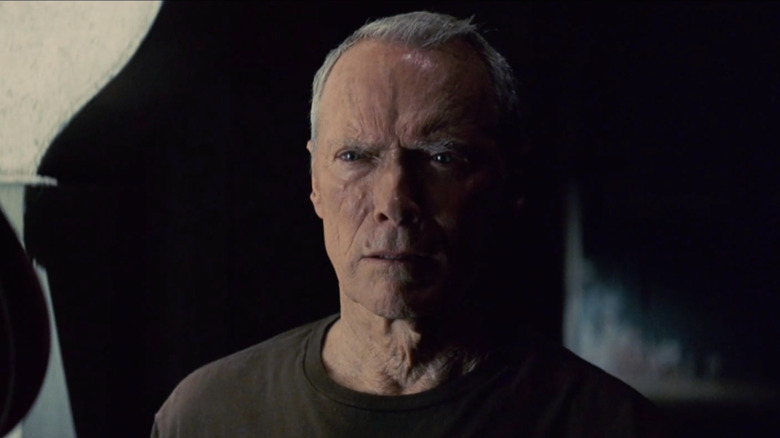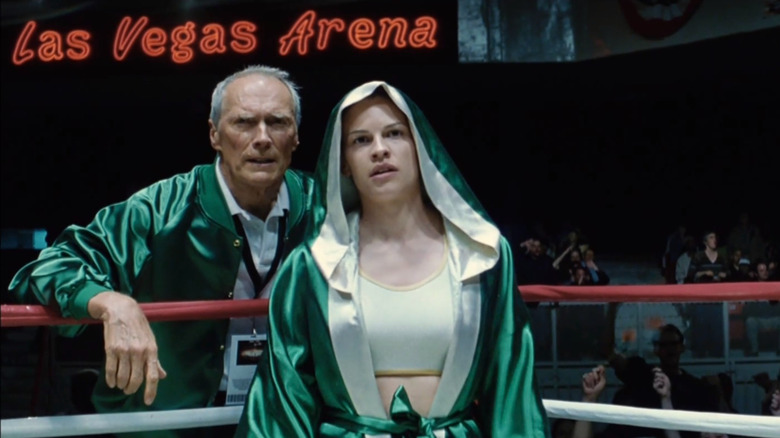Clint Eastwood Wanted Million Dollar Baby To Live Or Die On Its Own Terms
Before he pulled off the same feat again in 2004 with "Million Dollar Baby," Clint Eastwood had already won the Academy Award for Best Director and Best Picture over a decade earlier with his revisionist Western "Unforgiven." Eastwood also picked up nominations in those two categories for "Mystic River," only a year before "Million Dollar Baby." He had long since transitioned from the Dollars Trilogy and "Dirty Harry" film series into the Oscar royalty phase of his career. Much like Hilary Swank's underdog boxer, however, "Million Dollar Baby" was a film that took a lot of people by surprise, and not just because of the emotional wallop of its ending.
Despite his awards clout and his existing relationship with Warner Bros., which had distributed most of his films since "Unforgiven," Eastwood couldn't interest the studio in financing a boxing movie. It was only after he got another production and distribution company, Lakeshore Entertainment, behind "Million Dollar Baby" that Eastwood could get Warner Bros. to provide the other half of the financial backing he needed. Even then, he was working with much less money than big-budget films like Oliver Stone's "Alexander" and Robert Zemeckis' "The Polar Express," both of which were made for north of $150 million. In a 2004 interview with film critic Roger Ebert, Eastwood said of "Million Dollar Baby":
"I just wanted to make it. I don't want publicists hanging about. We stayed under the radar. With all the big $150, $200 million films out there, they thought this film was at a different importance level. I had about $25 million to make it with. They had their 'Alexanders' and 'Polar Expresses' they were working on, and I figured my movie was going to have to live or die on its own terms."
The $215 Million Dollar Baby
If there was any benefit to "Million Dollar Baby" having a lower budget than some of the blockbusters of the day, it's that it allowed Clint Eastwood to make the movie without as much studio interference. Eastwood told Roger Ebert that he was operating so independently that Warner Bros. had no idea it was sitting on another pot of Oscar gold until he screened the film for them later on:
"We went and made it, they didn't know anything about it, and after we showed it to them, they said, 'Jesus, it's not too bad.' Some people in the organization started getting enthusiastic. Eddie Feldman, the distribution guy, says, 'How shall we open it?' 'Why don't we just put it out sometime after Thanksgiving,' I said. He said we had to mount a campaign. 'No mounting a campaign, no mounting anything,' I said. 'Just see where it goes.'"
Ultimately, it was word of mouth that helped "Million Dollar Baby" become a box-office phenomenon, grossing over $215 million worldwide, according to Box Office Mojo. In addition to Best Picture and Best Director, the film also won Hilary Swank and Morgan Freeman Oscars for Best Actress and Best Supporting Actor.
Like Swank's character, the waitress-turned-prizefighter from a "scratch-ass Ozark town," "Million Dollar Baby" began from humble roots, but it's arguably a film that's now much more well-remembered than some of the other studio tentpoles that hit multiplexes in 2004. It just goes to show that sometimes it's better for studios to take a hands-off approach, let a filmmaker do their thing, and let a movie get by on the strength of its story.

